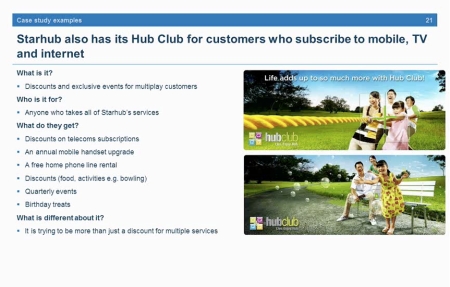Archive
On Mobile Loyalty
 A little over a week ago, consultancy Analysys Mason hosted a webinar entitled ‘Mobile loyalty schemes: best practice examples and key learnings’. Zeitgeist listened in…
A little over a week ago, consultancy Analysys Mason hosted a webinar entitled ‘Mobile loyalty schemes: best practice examples and key learnings’. Zeitgeist listened in…
Speaking in the webinar were Tom Rebbeck and Helen Kapapandzic. One of the key messages in the webinar was the distinction between customer retention and true loyalty campaigns. Retention can be achieved through short-term measures (e.g. discounts), loyalty is about longer-term investment. Keeping a customer loyal can benefit both the business and also the end user. According to a recent article in the Wall Street Journal referenced by the consultancy, there are myriad benefits to longevity at work, in marriage and by staying with the same providers and businesses. Loyalty it was noted, however, can only support other elements of a service that must already be in place.
For telcos, the key is in reconciling operator wants with customer needs. In the telecoms market in the Western world, where seemingly everyone has a mobile handset of one sort or another, the strategy has moved from winning new customers to keeping current ones. The market is saturated with a flat if not slightly falling rate of growth.
Churn is likely to increase this year over last year in the UK, but not in France. When Zeitgeist asked the reason for this disparity, he was told the reason was that telcos in the French market had focused a significant amount of marketing specifically on decreasing churn. In the UK, the increase is due to the beginning of the expiration of 24-month contracts (such as those affiliated with iPhones), which conversely made churn decline in 2010.
The webinar continued with a roundup of some selected case studies currently being employed by telcos around the world. These took the form of either financial or social-based schemes, and sometimes both. Aircel, for example, was an invitation-only service, offering special invitations to events, exclusive offers, and worked on a points-based system. Proximus seemed to be the most fun offer mentioned, focused as it was on younger customers, who would always be incentivised as there was always a prize guaranteed.
Vodafone’s loyalty scheme, with sponsorship of Formula 1 racing and the London Fashion Weekend, is deservedly well-known. With a simple thank you, and no requirements to join, it serves as an attractive loyalty tool. The loyalty scheme from Starhub seemed to be one of the most innovative and well-developed, a Quintessentially-esque programme, replete with triple play offers.
While it is tempting to think of customer loyalty schemes for telcos as similar in construction to those of supermarkets, the reality is in fact very different, as the consultancy pointed out. Tesco’s enormously popular Clubcard, as recently written about in The Economist, is there for the business to get as much information as possible on customer buying habits, to the extent that it could effect your insurance policy. Telcos already have a significant amount of data that illustrates user behaviour based on a much smaller range of products (SMS, data).
Those schemes that didn’t work, which the team at Analsys Mason came across, were ones involving points-based schemes that were extremely complicated, and might involve getting out an Excel spreadsheet. This kind of thing can be too time-consuming, and ultimately appeal to customers who are already loyal. As a trend, some operators were discontinuing points in preference of social, or simply overlaying it to create social engagement. Of course, as we all know, the key to a successful B2C campaign is often about personalisation. The difficulty though lies in the fact that it is usually easier to measure top-up schemes than emotional ones. This, however, does not alter the importance of personalisation. Rewards to drive tenure, celebrate anniversary of contracts or personal birthdays are all small touches which could be much more widely employed, said those at Analysys Mason.
In all it was an engrossing and stimulating lecture on consumer preferences, technological development and trends in communication. Zeitgeist looks forward to the next one.


